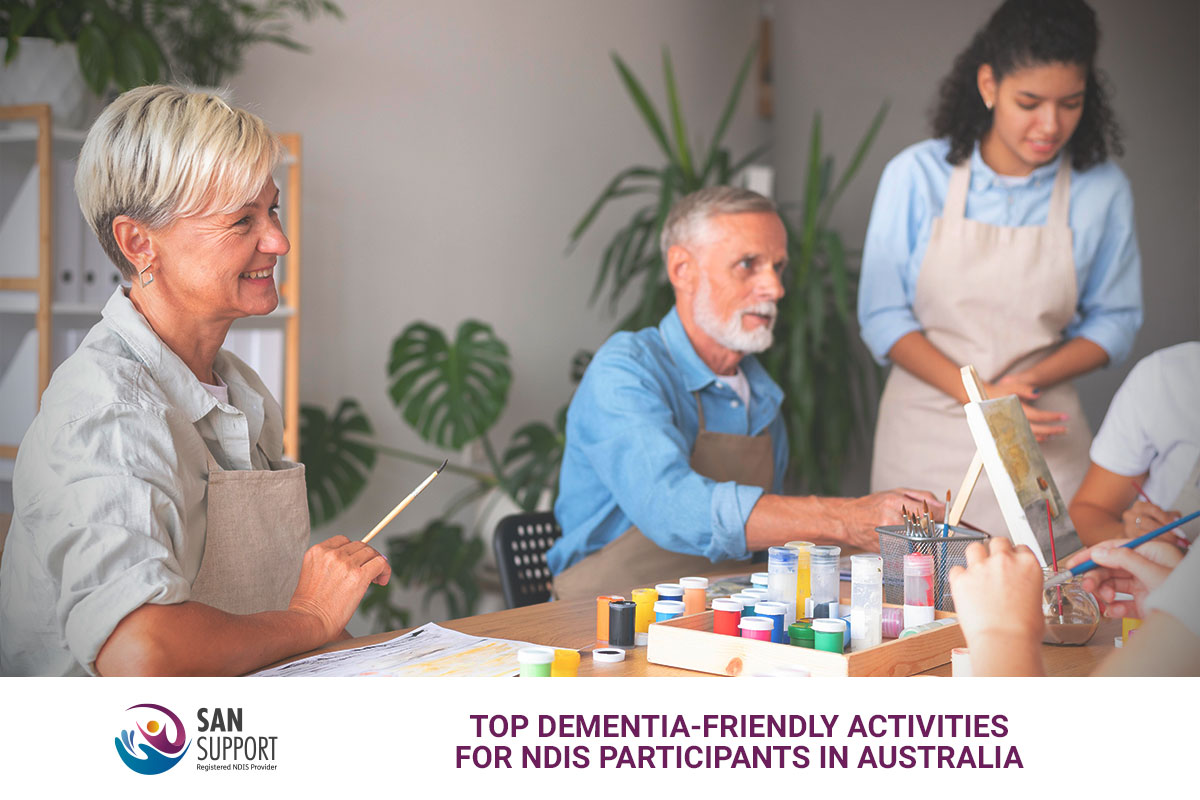
Supporting a person living with dementia goes beyond managing symptoms. It’s about creating opportunities to connect, express and enjoy life one moment at a time. While dementia can affect memory, judgement and communication, people living with this condition still benefit deeply from engaging in meaningful, person-centred activities.
When chosen thoughtfully, these activities help reduce anxiety, spark joy, support memory and build emotional resilience. They also create a sense of structure, help maintain physical health and encourage social interaction.
This guide explores how to select and adapt dementia-friendly activities and offers a wide range of practical ideas you can implement at home or in community settings.
The Benefits of Activity Engagement for People Living with Dementia
Regular, purposeful engagement provides more than just entertainment it significantly enhances wellbeing. When individuals participate in familiar or enjoyable tasks, they feel included, respected and connected to the world around them.
Key Benefits Include:
- Emotional Support: Activities ease restlessness, agitation and confusion, while promoting calm and contentment.
- Cognitive Stimulation: Simple mental tasks help preserve existing memory and thinking skills for longer.
- Physical Mobility: Gentle movement through walking, dancing or stretching maintains strength and coordination.
- Social Connection: Shared experiences foster communication and reduce isolation.
- Personal Identity: Familiar routines and hobbies remind individuals of who they are and what they love.
How to Choose the Right Activity
Selecting the right activity requires empathy, observation and flexibility. Every person’s interests, history and stage of dementia will influence what feels comfortable and enjoyable.
Start with the Person’s Life Story
Think about their favourite hobbies, past career, cultural background or family traditions. For example, a retired teacher may enjoy reading aloud, while a former gardener may find peace in tending to plants.
Match Current Abilities
Choose tasks that align with their physical and cognitive capacity. Avoid overly complex or frustrating tasks and instead focus on achievable, satisfying outcomes.
Create a Comfortable Environment
Ensure that lighting, noise levels, seating and temperature are supportive. A calm, distraction-free environment makes participation easier and more enjoyable.
Prioritise Flexibility
If something isn’t working, change it. Individuals may lose interest, feel tired or become overwhelmed. Be willing to shift gears and try something else.
Effective Activities for People with Dementia
Below is a list of tried-and-true activities that you can adapt to suit various stages of dementia. These activities aim to engage the senses, stimulate the mind and promote emotional wellbeing.
Singing Familiar Songs
Use well-known music to evoke emotion and trigger memory. Singing encourages social interaction and lifts mood.
Dancing to Music
Incorporate gentle movements with music. Whether seated or standing, dancing promotes joy and mobility.
Walking Outdoors
Go for short, guided walks in familiar areas. Walking supports physical health and reduces restlessness.
Attending Local Community Events
Visit music performances, markets or exhibitions. Choose smaller, quieter venues with familiar themes.
Creating Art or Crafts
Try painting, drawing or colouring. These activities provide a creative outlet and support motor skills.
Gardening
Encourage potting plants, watering flowers or pulling weeds. This sensory activity can be both calming and purposeful.
Looking Through Photo Albums
Use printed photos with names and dates. Recalling people, places and events can inspire stories and connection.
Simple Card or Board Games
Play games like dominoes, picture matching or Bingo. Keep the focus on enjoyment, not competition.
Reading Aloud
Select short stories, poetry or magazine articles with large print. This can be soothing and stimulating.
Assisting with Simple Cooking
Involve the person in tasks like stirring, decorating or arranging ingredients. Cooking stimulates memory and sensory engagement.
Completing Puzzles
Use large-piece jigsaws with bright, clear images. Choose puzzles related to nature, animals or family scenes.
Gentle Massage
Provide light touch to hands or shoulders using lotion. This physical contact reduces anxiety and encourages connection.
Seated Yoga or Stretching
Encourage simple movements and breathing exercises. These promote relaxation and physical strength.
Enjoying a Picnic
Take a break outside with simple food and conversation. Being in nature offers a change of scenery and improves mood.
Aqua Therapy or Swimming
Use shallow pools or hydrotherapy programs for safe, joint-friendly movement. Water activities are soothing and supportive.
Tips for Adapting Activities as Dementia Progresses
As a person’s condition changes, it’s important to revisit and simplify activities:
- Break tasks into small, manageable steps
- Provide visual cues and demonstration
- Focus on one task at a time
- Celebrate progress, not perfection
- Respect their need to pause or decline
Encourage participation, but never force it. Some days, simply sitting together or observing can be just as valuable as active involvement.
Frequently Asked Questions
What types of activities reduce boredom in people with dementia?
Routine-based, sensory-rich and familiar tasks like listening to music, gardening or crafts tend to be the most effective. These keep the person engaged and emotionally grounded.
What games work well for people with dementia?
Games that involve repetition, visual aids and low complexity work best. Try matching games, Bingo or simple puzzles to support cognitive function and enjoyment.
How can I mentally stimulate someone with dementia?
Read aloud, play memory-based games or encourage storytelling through photo albums. Include a mix of conversation, music and movement to keep the mind engaged.
How do I adapt activities for different dementia stages?
Use more structured, guided activities in early stages. As dementia progresses, shift toward sensory-based experiences with simple, soothing elements like music, touch or nature.
Conclusion: Creating Meaningful Moments Through Activity
Activities are more than just ways to pass time they offer comfort, connection and joy. When chosen with care and delivered with empathy, they support people living with dementia in ways that medical care alone cannot.
Each walk, song or shared story is a reminder of the individual’s worth, personality and history. Whether you’re a family member or a support worker, your ability to bring joy through activity can transform daily life for someone with dementia.
About SAN Support
SAN Support is a trusted NDIS registered provider delivering high-quality, person-centred disability services across Brisbane. Our trained support workers specialise in dementia care and help participants engage in safe, tailored and meaningful activities that support their wellbeing and NDIS goals. We offer support across Personal Care, In-Home Supports, Community Participation, Supported Independent Living (SIL) and Support Coordination ensuring individuals living with dementia receive the care and engagement they deserve.
